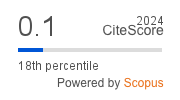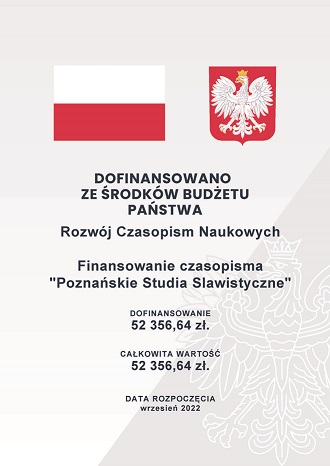Current Issue
„Poznańskie Studia Slawistyczne” (“Poznań Slavic Studies”) is a six-monthly journal co-published by the Adam Mickiewicz University in Poznań. The journal was established at the Faculty of Polish and Classical Philology of Adam Mickiewicz University by the Institute of Slavonic Philology. The journal publishes original and previously unpublished works concerning the whole Slavonic culture: its southern, western and eastern varieties. Each issue of the journal is devoted to a different subject matter and run by a different thematic editor. Main themes of each issue aim to answer current challenges of humanities. The journal's leading discipline is literature studies, but monographic issues also embrace linguistics, culture, history, art history, religion or sociology. We publish peer-reviewed articles and scientific essays, as well as review articles (which are also addressed to peer-reviewers). The journal is co-created by an international team of experts (the Scientific Council), an international group of authors and international reviewers. We publish in all Slavic languages as well as in English, German and Italian.
The journal does not charge any fees for article submission, review process and article publication.
INDEXED IN:
Scopus, CEEOL, CEJSH, ERIH PLUS, ARIANTA, PKP Index; ICI Journal Master List, Google Scholar; WorldCat, THE KEEPERS, ROAD, WIKIDATA, OPENALEX, EZB, CROSSREF
JOURNAL METRICS:
Ministry of Science and Higher Education (2025): 70
Indeks Hirscha: 5
Poznań Slavic Studies are indexed on the 'A' list of international journals for the Humanities by the Italian Evaluation Agency of University and Research (ANVUR).

DOI: 10.14746/pss
ISSN (Print): 2084-3011
ISSN (Online): 2450-2731
PUBLISHED WORK ARE LICENSED UNDER A CREATIVE COMMONS:
- from issue 27 (2024) published under a Creative Commons Attribution 4.0 International License.

- from issue 8 (2015) till 26 (2024) published under a Creative Commons Attribution-NoDerivatives 4.0 International License.
- before 2015: all published texts are copyrighted.
DATA ARCHIVING
The PRESSto platform digitally preserves the content of this journal using the PKP Preservation Network (PKP PN), which provides digital long-term preservation of data and secured access to the content of the journal.
The journal „Poznańskie Studia Slawistyczne” complies with the I40C standards for open citations.
PUBLISHER
Adam Mickiewicz University in Poznań
FUNDING

The funding for the journal „Poznańskie Studia Slawistyczne” was provided under Agreement No. RCN/SP/0141/2021/1.
Announcements
The Communist Past in Slavic Cinematography: Reminiscences, Contestations, (Re)interpretations
Slavic emigration – revisions
The definition of emigration, in any of its contexts, is often based on binary systems and established oppositions involving axiological disputes: homeland versus foreign land; return versus departure; rootedness versus uprootedness; choice versus necessity; migration versus stabilisation; stranger versus one's own; gain versus loss.
We are accepting submissions until April 30, 2026, via the website of the journal Poznańskie Studia Slawistyczne on the Pressto platform.
More…
Programme: Development of academic journals for “POZNAŃSKIE STUDIA SLAWISTYCZNE” (‘Poznań Slavic Studies’) biannual
"Poznańskie Studia Slawistyczne" w latach 2022-2023 były objęte programem Rozwoju Czasopism Naukowych z Ministerstwa Nauki i Szkolnictwa Wyższego i otrzymały dofinansowanie zgodnie z umową nr RCN/SP/0141/2021/1.
More…

